| Article ID | Journal | Published Year | Pages | File Type |
|---|---|---|---|---|
| 4297991 | Journal of Surgical Education | 2013 | 11 Pages |
BackgroundThe Accreditation Council for Graduate Medical Education requires residents to be trained in practice-based learning and improvement as well as systems-based practice. In an effort to establish a formal curriculum for graduate medical education, a Performance Improvement (PI) Training Program was initiated at Memorial University Medical Center. Training for the chief residents across all residency programs focused on the basic Six Sigma framework. Chief residents chose faculty sponsors and were also mentored by Six Sigma–trained staff. Faculty and physicians who participated in the initiative received PI/Continuing Medical Education credit.MethodsA total of 17 presurveys and postsurveys were completed on 7 outcome measures. Nonparametric Wilcoxon signed rank 2-tailed tests were performed to test for significant change from presurvey to postsurvey.ResultsAnalysis of the 2-year data (2009-2011) found statistically significant improvement for all 7 outcome measures. The surgical residents’ PI Project for 2011 included the development of the Venous Thromboembolism Reassessment Tool. The project included a multidisciplinary team to develop a computer prompt that continued to trigger if the physician launched the prophylaxis or treatment form without ordering anticoagulation. The new prompt resulted in a 391% increase in anticoagulant orders.ConclusionsThis study demonstrated that the resident-based PI Training Program was innovative, practical, and comprehensive. Education, tools, and skill development were provided on quality and PI theory and practice for resident physicians in support of the Accreditation Council for Graduate Medical Education core competencies of professionalism, practice-based learning and improvement, and systems-based practice.
